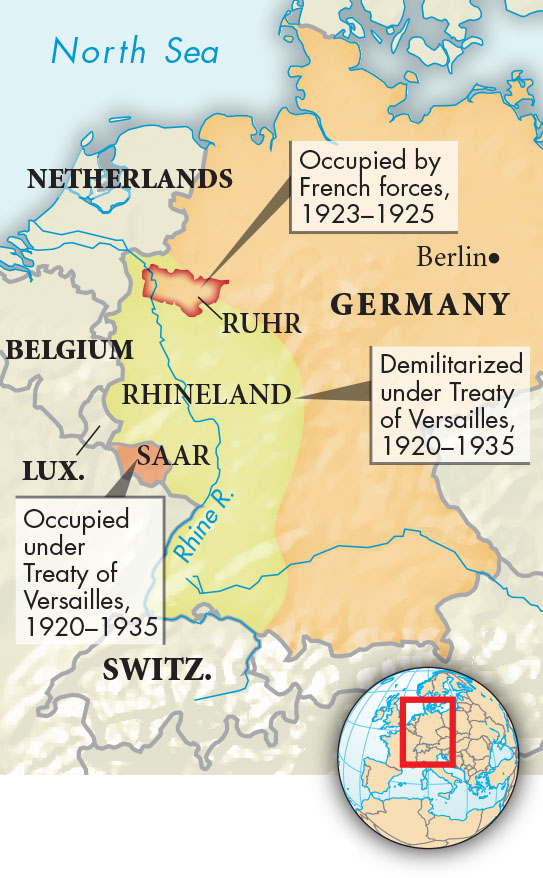A History of World Societies:
Printed Page 873
A History of World Societies Value
Edition: Printed Page 883
Germany and the Western Powers
Germany held the key to lasting peace, but plagued by Communist uprisings, reactionary plots, and popular disillusionment with losing the war, Germany’s moderate socialists and their liberal and Catholic supporters faced an enormous challenge. They needed time (and luck) if they were to establish a peaceful and democratic republic. Progress in this direction required understanding yet firm treatment of Germany by the victorious Western Allies. Yet nearly all Germans and many other observers immediately and for decades after believed the Versailles treaty represented a harsh dictated peace and should be revised or repudiated as soon as possible. Many right-
Historians have recently begun to reassess the treaty’s terms, however, and many scholars currently view them as relatively reasonable. They argue that, given Germany’s efforts and losses in the war, Germans would not have been satisfied with any treaty imposed on them, and that much of German anger toward the Allies, as well as much of Hitler’s appeal, was based more on perception than reality. With the collapse of Austria-
This is not to say, however, that France did not seek some degree of revenge on Germany for both the Franco-
The British soon felt differently. Prewar Germany had been Great Britain’s second-
While France and Britain drifted in different directions, the Allied reparations commission completed its work. In April 1921 it announced that Germany had to pay the enormous sum of 132 billion gold marks ($33 billion) in annual installments of 2.5 billion gold marks. The young German republic — known as the Weimar Republic — made its first payment in 1921. Then in 1922, wracked by rapid inflation and political assassinations and motivated by hostility and arrogance as well, the Weimar Republic announced its inability to pay more and proposed a reparations moratorium for three years.

The British were willing to accept a moratorium, but the French were not. Led by their prime minister, Raymond Poincaré (1860–
Strengthened by a wave of patriotism, the German government ordered the people of the Ruhr to stop working and to nonviolently resist French occupation. The French responded by sealing off the Ruhr and also the entire Rhineland from the rest of Germany, letting in only enough food to prevent starvation.
By summer 1923 France and Germany were engaged in a great test of wills. French armies could not collect reparations from striking workers at gunpoint. But French occupation was paralyzing Germany and its economy. Needing to support the striking Ruhr workers and their employers, the German government began to print money to pay its bills. Prices soared, and German money rapidly lost all value. In 1919 one American dollar equaled nine German marks; by November 1923 it took over 4.2 trillion German marks to purchase one American dollar. Many retired and middle-
In August 1923, as the mark’s value fell and political unrest grew throughout Germany, Gustav Stresemann (1878–